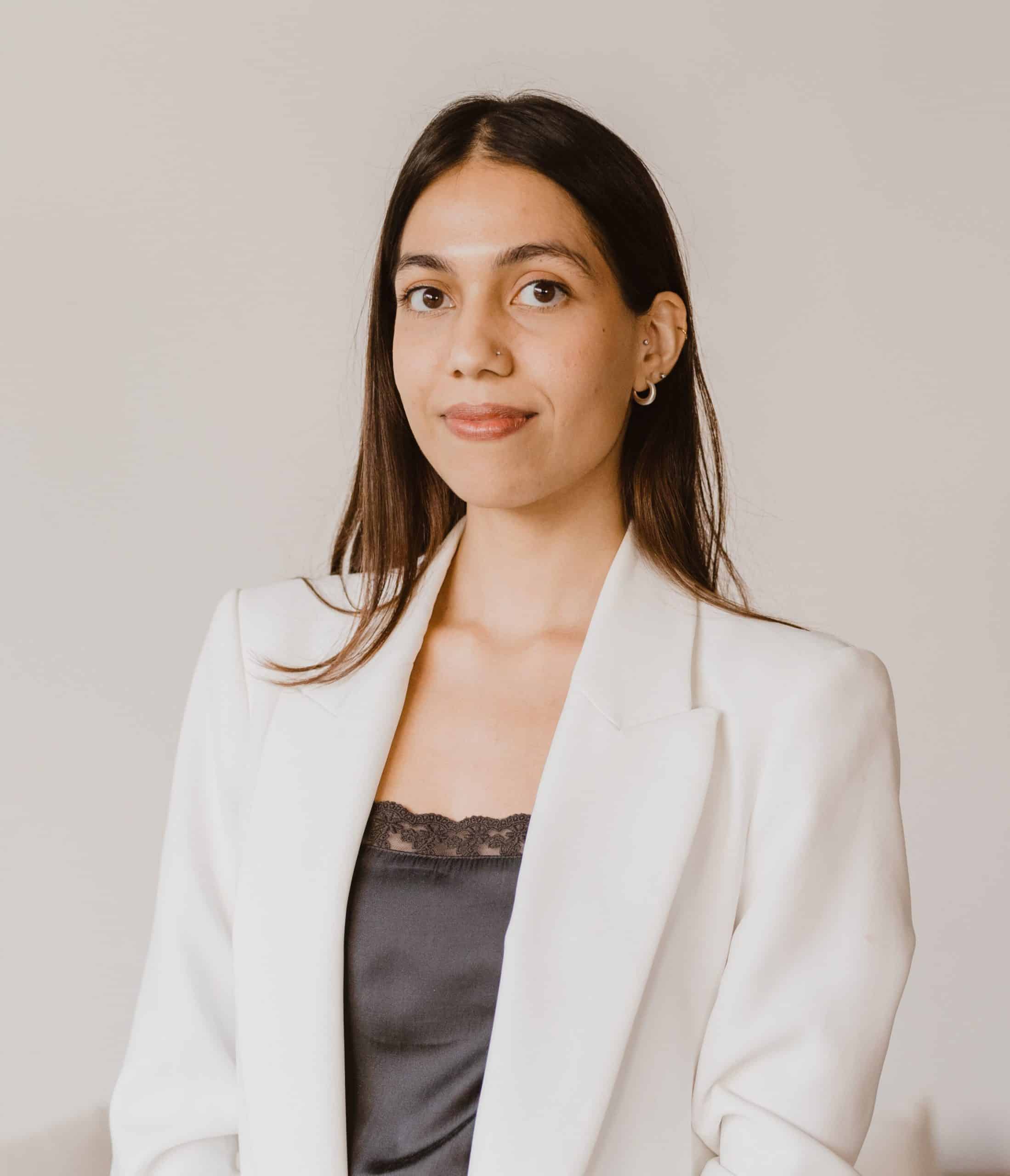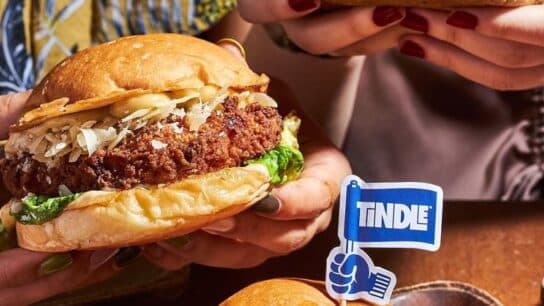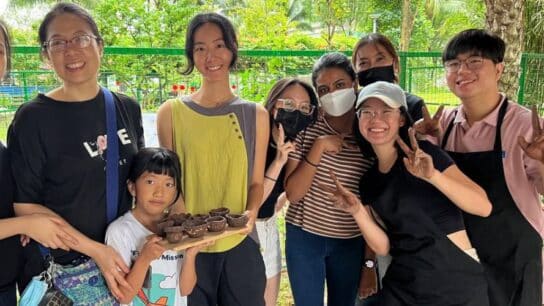Trailblazing the vegan and wellness movement in Hong Kong, rising foodpreneur Melody Liang shares insights on her journey to founding MOMO Almond milk, the growing popularity of non-dairy alternatives, and her almond milkman concept.
Almond crusher Melody Liang combined her passion for plant-based ingredients and reinvigorating the local holistic food and beverages (F&B) space when she founded her vegan milk concept, MOMO. Committed to introducing a holistic approach to busy Hong Kongers’ everyday routines, Melody has taken a step further to work towards becoming a certified functional medicine coach, to improve her wholesome teachings and way of living.
Aimed at the city’s expanding vegan, vegetarian, and flexitarian community, Melody’s homegrown products are modified to cater to diverse tastes and dietary preferences. Her high-quality and nutritious almond drinks and nut butters are completely vegan, with zero preservatives, thickeners, or additives, making for a premium alternative to commercially-available dairy products.
From her struggle to find nutritious dairy alternatives in Hong Kong, to innovating her own wholesome almond-based recipes, to practicing holistic wellbeing, the rising foodpreneur shares the secrets behind her wellness concept and how it has grown to be a staple in the local F&B scene.

Can you tell us about your journey entering into the F&B industry?
MOMO is a modern wellness brand, and our aim is to introduce a more mindful lifestyle for people.
I was not in the food and beverages industry at all, it all started with one product, our Almond Drink. I was going through some health problems where I had to experiment with cutting out several food items from my diet, dairy being one of them.
During that time, I had moved back from the United States, and was quite used to having fresh plant-based, and vegan options that were readily available. I wanted to find that option and convenience in Hong Kong, yet there were not many options to choose from. I ended up trying different products from the local supermarket, but you can really taste the difference when the product is highly-processed, manufactured, and shipped from overseas, versus, [locally] and naturally produced, and has all these benefits.
So, I asked myself, why don’t we have such a concept in a modern city like [Hong Kong], especially since everyone is transitioning into a [more healthy lifestyle], and even veganism. I started looking into plant-based options, and eventually began making my own almond milk.

Why almonds, and what nutritional value do they have?
I gravitated toward almonds because of their distinct taste. Whereas other plant-based options [such as] soy and oats do not have that. So, it was an easy choice for me, as I wanted to create something that would taste really heavy and rich. Almonds are also protein-rich and have good fats, with many nutritional benefits.
I started making this for myself, and my family, and then eventually my friends tried it and liked it. There were multiple trials, errors, and experiments to try and not use any artificial ingredients to develop and stabilise the Almond Drink. I used different methods from gentle pasteurisation to kill the bacteria, to keep the nutrients and flavours intact.

Have you always led a vegan and healthy lifestyle?
When I moved back to Hong Kong, there were certain lifestyle changes that happened. I lived alone in New York and Boston, and would always cook and shop for myself. I would often go to the farmers’ market and get all these fresh ingredients.
Coming back, I moved in with my family- as for Chinese families, we would normally eat together- but I didn’t get to control what I put into my body- I started eating less at home and was making bad food choices which eventually wreaked havoc on my digestive system and gut health.
I began to adjust and make some lifestyle changes, in terms of which, I did a detox diet and worked with a functional-medicine doctor, [through whom] I learned plenty about the holistic way of healing the body by getting to the root causes of the problem. It was mainly about my diet, which included getting rid of gluten, and other triggering foods, such as dairy and alcohol.
I was also doing yoga training back then, and having that bodily awareness, as well as a connection with both the inner-self and outer-body, really helped me.

What are your aspirations for your wellness concept in Hong Kong?
In the beginning, it was simply a desire to create and share plant-based options that were freshly made for people. It started with our vegan products, and then I dwelled deeper into yoga teaching, and learning more about functional medicine. As I’m training to be a coach now, the whole concept of wellness and building that ecosystem to educate people on our body as a whole has [become an important part of MOMO].
We live in such a physical world where we seek instant gratification, which [has become] the modern way of living, but we have forgotten about that slow way where we allow our body to heal and let everything flow. We want to bring in more awareness and build more mindfulness toward our surroundings and ourselves, while taking care of ourselves a little better.

How does MOMO intend to build on that to promote healthy and holistic living in the city?
In the beginning, I always thought that if you wanted to be in the F&B industry, you should open up a restaurant, but I realised that it is [quite] hard in Hong Kong, and rather unrealistic for me to have a brick-and-mortar. Last year, we did many pop-ups for MOMO, and the concept was more product-based.
This year, we have collaborated with many like-minded individuals, who wish to promote and offer healthy-eating options in their cafes or restaurant. The first one was with Grain of Salt, and it was our stepping stone to doing collaborations with other brands and people, where we can simply add our ideas to their current selection.
This year onwards, we started working with KIN Food Halls in Quarry Bay. It streamlined everything as they represent the vendors there, and it was a great opportunity for us to feature our dishes and ideas. We can change the menu depending on the season, and are currently launching something for this fall, which is exciting!
KIN has introduced quite an innovative concept, with a goal to share Asian dishes with plant-based and healthy options. That’s where we fit in KIN’s menu- we provide plant-based, mostly vegan and vegetarian options, with some gluten-free [options] as well, including healthy desserts and lunches.

What inspires your recipe ideas?
It happened to be quite organic- the milk was always there as it was our signature product that launched the brand, and with that, [we added] the nut butter. Our range of simple staples is made with good ingredients and great quality, [developed through] experimenting with different flavours, and of course, using our almond milk as the base.
It comes from that starting point of inspiration, and you slowly build [on that], and keep tasting and testing what works.
Most of MOMO’s products are made locally, could you share some more about your backend operations, and how you intend to approach this alongside future expansion?
We would love to keep sourcing locally as much as we can. There are many local farms around Hong Kong that have developed a system to [produce] and send fresh organic vegetables. [Together] with KIN we work with farmers and companies that source [produce] locally from different farms.
With the nuts, although they are not sourced locally, they are good quality, and universally sourced from the States and Australia, with proper certification. We are supporting organic growers and that ecosystem of farmers who wish to do good for the environment and the food system.
In terms of expansion, I hope to keep going that route, and when we are able to expand and do more, find more interesting nuts and seed farms that we could work with.

From starting out as a vegan product brand, how has MOMO shifted its focus to bringing consumers’ health and wellness to the forefront of its concept?
I am working towards that for myself as well, along with the brand. So with the brand, we are doing collaborations with other people where we can showcase more of such [healthy, plant-based] options. Personally, I have been teaching yoga, and integrating the three things that I am interested in.
What I have learned about health coaching is that everyone is on their own journey and we are constantly given new information about health and wellness. Everyone is trying to live a healthier lifestyle because that is the direction of where life is going now, and I would like to help people bridge the gap between finding the root causes of the problems and offering a sustainable solution to make those lifestyle changes.
[Through] my yoga coaching, I want to help [individuals] achieve physical alignment, which will bring a sense of mental clarity, as once your body feels great, naturally, your mind will click. With more awareness, you have more control of your life and that’s when you make a commitment to yourself and slowly make those changes.

How do you keep up with changing industry trends?
There is definitely a [healthy eating] trend right now, especially in Hong Kong. We adapt to change so swiftly, and unfortunately, sometimes run out of these trends just as quickly. But, I strongly believe in what we are doing and that this is making a long-lasting impact because there is nothing better, deeper, and [honest] than taking care of yourself.
What are some of the functional rituals in your everyday wellness routine?
I have developed a slow morning routine that I do every day. There are scientific reasons behind this because we want to get our bodies and our souls in a clear state before we actually start our day.
What I do in the morning is oil pulling, an ancient Ayurvedic ritual where I swish coconut or sesame oil in my mouth, and it physically gets rid of toxins. Having that kind of stimulation helps in the morning and aids with our digestion as well.
I also have a notebook and a gratitude journal which I fill in with what I’m grateful for, and with positive reinforcement at the beginning of the day, which puts everything into perspective.

What’s next for your personal entrepreneurial and wellness journey?
I am halfway through my functional medicine coaching program. I will be certified around early next year, and am still exploring what I can do within the realm of coaching. I want to get into that and I could perhaps further learn and tap deeper into understanding our [special connection with food], which could benefit many people.
Are there any exciting campaigns you are working on?
We have the milkman campaign coming up to celebrate our idea of a mobile, subscription-[based] milkman for everyone! [The campaign] is also celebrating Hong Kong, [while] the concept is quite universal, as we want to capture the essence of living in this city.
We are also launching a few new things, something for this fall, and more of our delicious desserts and waffles are coming your way!

Where can we shop for your products?
You can find our products online and you can find us at BE-JUICED, CAKE OF STARDUST, and Organic Plus Stores. They are all local and small shops, and I do believe in supporting the local community. They are all like-minded people who want to share good products and healthy delicious food, so go there and check it out!

Related Articles
An Insider’s Guide to Hong Kong’s Best Vegetarian & Vegan Spots
Meet the Female Founder Behind Social Enterprise App Pay-A-Vegan





